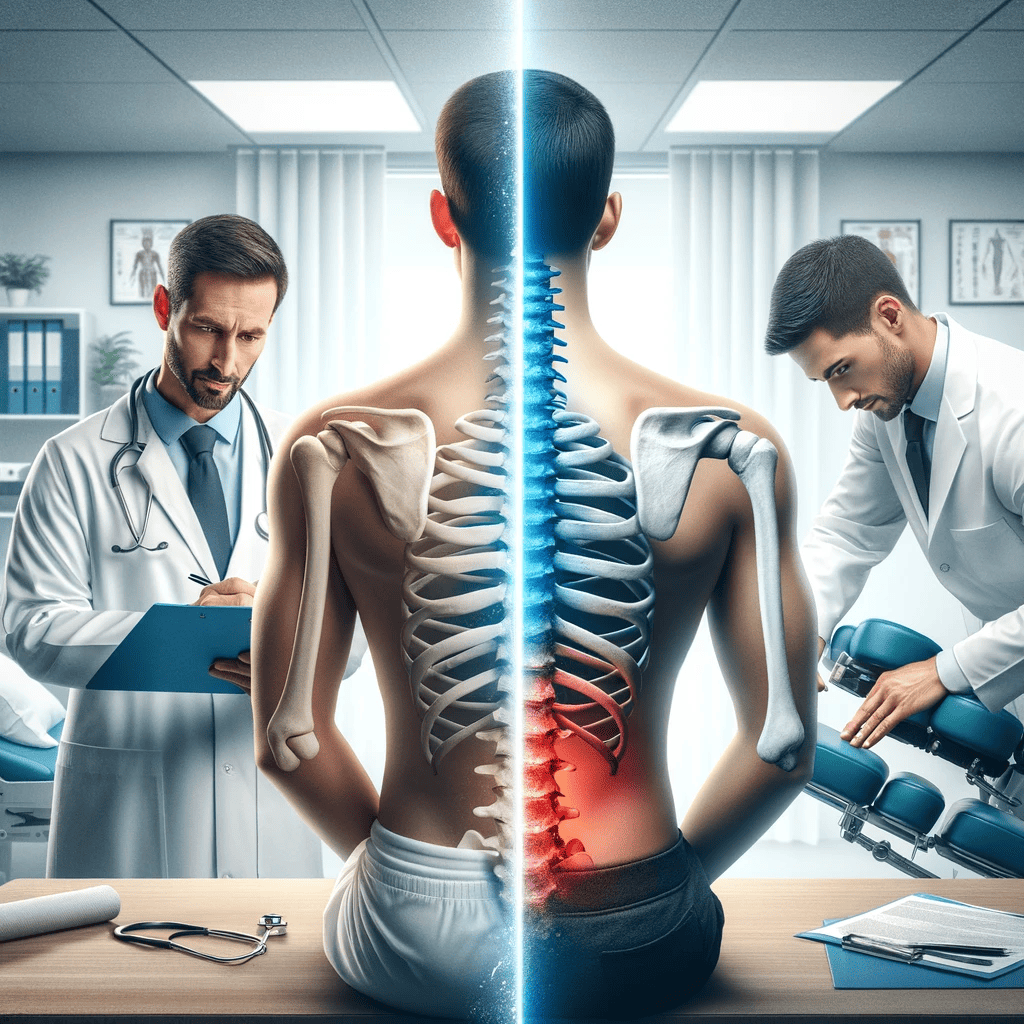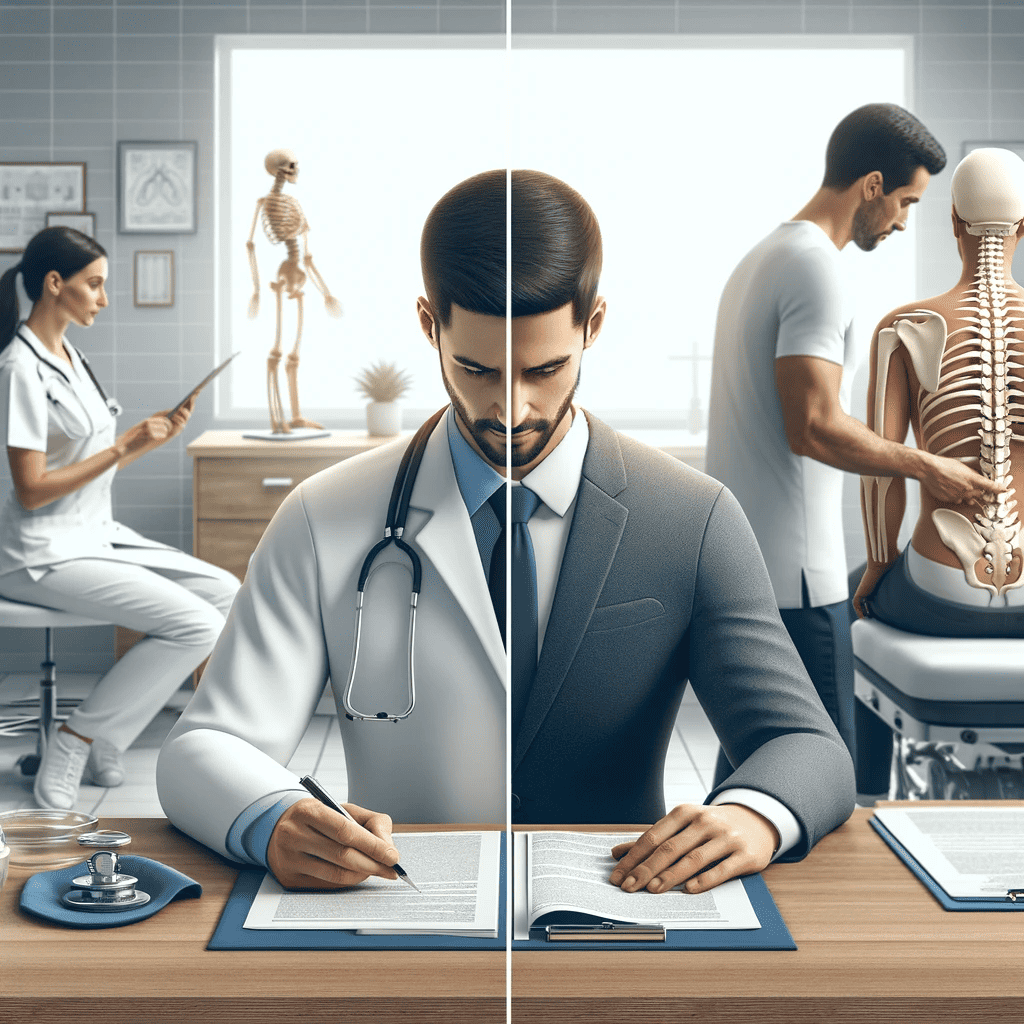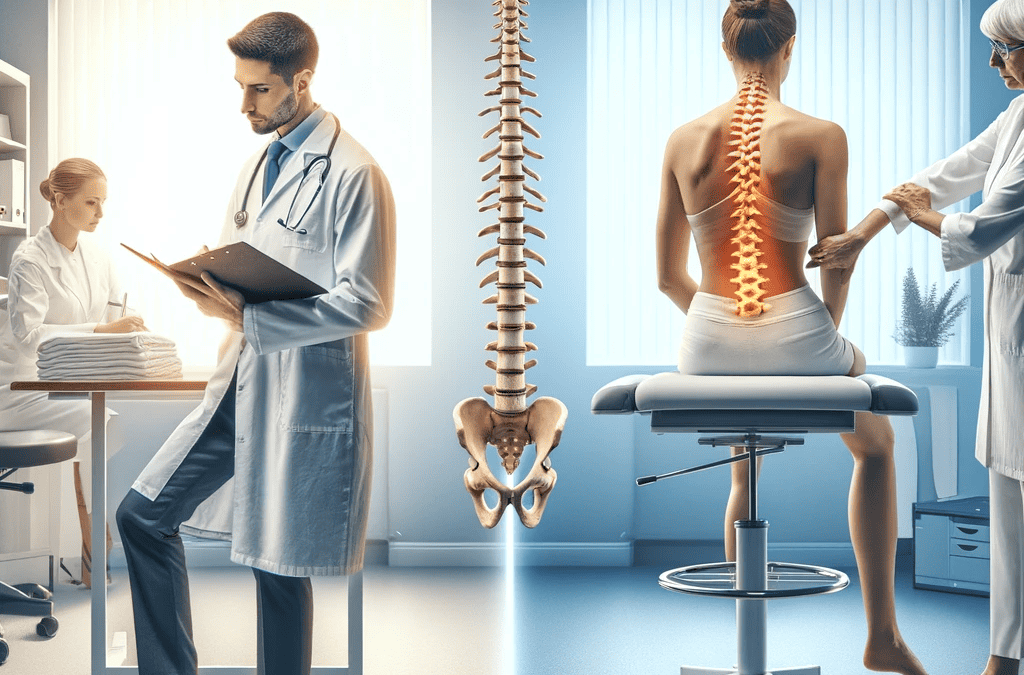In the aftermath of a vehicular mishap, the crucial decision of choosing between a doctor or a chiropractor can significantly impact your recovery journey. This guide aims to illuminate the pivotal aspects of making this choice, particularly emphasizing the specific roles and benefits of each healthcare path.
As we dissect the nuances of ‘Doctor or Chiropractor After a Car Accident’, our goal is to provide you with the necessary insights to make an informed decision. Whether it’s dealing with immediate physical trauma or long-term musculoskeletal issues, this article will serve as your roadmap to understanding which medical professional best suits your post-accident care needs
Doctor Or Chiropractor After a Car Accident?
As an answer to whether you should choose a doctor or a chiropractor after an accident, it’s recommended to consider chiropractic care promptly if you experience discomfort or within a few days of the incident.

Studies in the field of post-accident chiropractic care suggest that patients often report more substantial improvements when they begin their chiropractic treatment shortly after the accident.
Should You Visit a Chiropractor or a Doctor After a Car Accident?
When determining the best course of action following a car accident, considering chiropractic care is highly advisable, especially for musculoskeletal complaints like back pain or whiplash. Chiropractors specialize in these areas, offering effective, non-invasive treatments that can expedite recovery.
While doctors are essential for acute, severe injuries and internal issues, chiropractors excel in managing and rehabilitating injuries that affect your movement and comfort, often without the need for drugs or surgery.
Car Crash: Chiropractor vs. Orthopedic Doctor – Understanding the Differences
Both chiropractors and orthopedic doctors focus on the musculoskeletal system, but chiropractic care often provides a more targeted approach for those recovering from car accidents. While orthopedic doctors have a broad skill set, including surgery, chiropractors specialize in non-surgical methods that not only relieve pain but also enhance bodily function and mobility.
Their hands-on techniques are particularly effective in addressing the common after-effects of car accidents, such as spinal misalignments and soft tissue injuries.
ER or Chiropractic Treatment for Car Accident Injuries?
In cases of non-life-threatening injuries from a car accident, such as strains, sprains, or joint discomfort, chiropractic care should be considered a primary treatment option. While the ER is crucial for immediate, severe injuries, chiropractic care offers specialized treatment for less acute injuries.
This care is focused on pain relief and functional recovery, helping to restore mobility and alleviate discomfort without the need for invasive procedures. For many, starting with a chiropractor can lead to quicker and more effective rehabilitation after a car accident.
Understanding the Roles of Different Health Professionals
Knowing what each professional specializes in can help in making the right choice for your situation.
What is a Chiropractor?
A chiropractor is a health care professional focused on the diagnosis and treatment of neuromuscular disorders, with an emphasis on treatment through manual adjustment or manipulation of the spine. Chiropractors aim to reduce pain and improve the functionality of patients, as well as to educate them on how they can account for their own health via exercise, ergonomics, and other therapies to treat back pain.
What is an Orthopedic Doctor?
Orthopedic doctors specialize in the diagnosis, treatment, prevention, and rehabilitation of injuries, disorders, and diseases of the body’s musculoskeletal system. This specialization covers everything from simple bone fractures to complex surgeries, making orthopedic doctors versatile in treating a wide range of physical injuries, particularly those sustained in car accidents.
The Difference Between a Chiropractor and an Orthopedic Doctor
The primary difference lies in the treatment approach. Chiropractors typically use hands-on spinal manipulation, whereas orthopedic doctors may employ a wider range of medical treatments, including surgery. Chiropractors often focus on holistic care and preventative strategies, while orthopedic doctors are more inclined towards acute injury treatment and surgical interventions.
Decision Making: When to See Which Professional
Making the right choice between a chiropractor and a doctor can significantly impact your recovery process.
When to See a Doctor After a Car Accident
You should see a doctor immediately if you have severe injuries, signs of a concussion, internal pain, or if your injuries require surgical intervention or diagnostic imaging.

Medical doctors are equipped to handle a wide range of injuries and can provide comprehensive care, from initial diagnosis to treatment and follow-up.
When to See a Chiropractor After a Car Accident
Consider seeing a chiropractor if you’re experiencing back pain, neck pain, whiplash, or other musculoskeletal issues. They can provide pain relief and assist in restoring mobility without invasive procedures. Chiropractors specialize in non-invasive techniques that can be crucial for people wanting to avoid the potential risks and recovery time associated with surgery.
When to See a Chiropractor vs Orthopedic Surgeon
For injuries that may require surgery, such as torn ligaments or severe bone injuries, an orthopedic surgeon is the right choice. For non-surgical treatment of back and neck pain, a chiropractor is more suitable. Chiropractic care is often used for rehabilitation and long-term wellness, focusing on alignment, pain relief, and the promotion of natural healing.
When to Go to the Emergency Room
Go to the ER for any life-threatening injuries, severe pain, deep wounds, or if you suspect a serious condition like a spinal cord injury or internal bleeding. Emergency rooms are equipped with the necessary tools and staff to address immediate and severe health concerns, ensuring that patients receive the urgent care they need in life-threatening situations.
Benefits and Considerations of Each Approach
Each treatment option offers its unique benefits and should be considered based on your specific needs.
The Benefits of Immediate Medical Attention after a Car Accident
Immediate medical attention ensures that life-threatening injuries are treated promptly. It also provides a solid medical record, which can be crucial for insurance claims and legal purposes. Early diagnosis and treatment can significantly impact the recovery trajectory, reducing the risk of complications and ensuring optimal outcomes.
Post-Accident Recovery: Long-Term Benefits of Chiropractic Care
Chiropractic care can provide long-term relief from chronic pain and improve mobility after a car accident. It’s a non-invasive approach that focuses on the body’s natural ability to heal itself. Regular chiropractic treatments can aid in aligning the spine, relieving tension, and preventing chronic conditions from developing or worsening.
Conclusion
In summary, the decision to visit a doctor or a chiropractor after a car accident hinges on the specific nature of your injuries and your recovery goals. While doctors are indispensable for acute and severe injuries, chiropractors play a crucial role in holistic, non-invasive treatment, particularly for musculoskeletal issues common in car accidents, such as back pain and whiplash.
For those leaning towards chiropractic care, we highly recommend EastsideIdealHealth. Our skilled chiropractors at EastsideIdealHealth are dedicated to providing personalized care that addresses your unique needs and aids in your recovery journey. With a focus on alleviating pain, restoring mobility, and promoting overall wellness, our team is here to support you every step of the way after your car accident. Don’t hesitate to reach out to EastsideIdealHealth for comprehensive and compassionate chiropractic care that prioritizes your health and well-being


Recent Comments